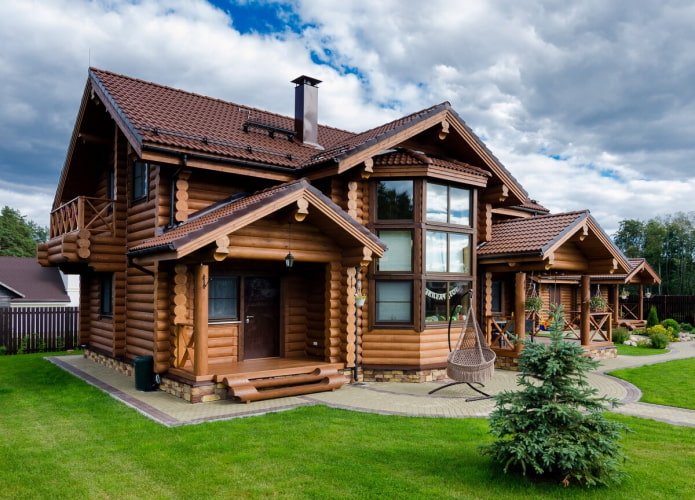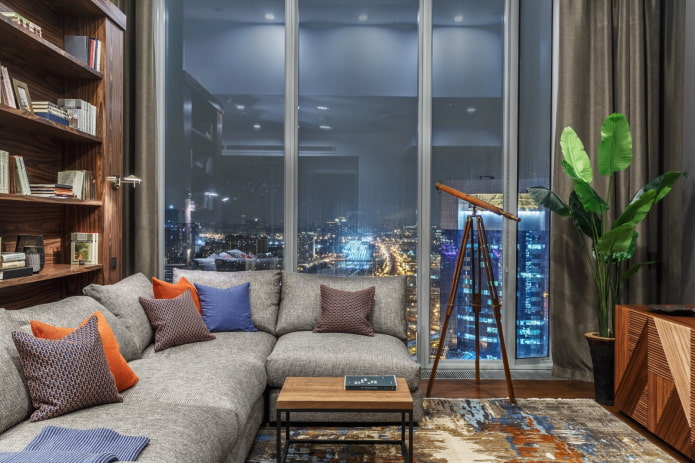Pros and Cons of Private Houses
Choosing and buying a good house is not easy, and building one is even more difficult. Therefore, before starting a deal, you should be sure of the need for such a project.
Pros of a house
- A spacious house. A square meter in a house is much cheaper than in an apartment: therefore, their area is on average 20-50% larger. If you are building a house from scratch, create a construction plan for the needs of your family. By setting the required number of rooms and their area, you will get the layout of your dreams.
- The ability to increase living space. The only way to increase a room in an apartment is to combine it with a balcony. And many redevelopment options are prohibited by the BTI. In a finished house, you can easily make an extension or change the layout if such a need arises. However, some changes also need to be agreed upon, for example, the construction of a new floor.
- Clean air. The TOP advantages of houses necessarily include ecology. In villages and towns there are fewer cars, no harmful industrial production and much more greenery. Depending on the location of the settlement, there may be a river or lake, forest or meadows nearby. Such an atmosphere is much healthier than city smog.
- Availability of a plot. You can manage your own house territory as you wish – from growing a garden / vegetable garden to additional buildings in the form of a bathhouse or garage. In addition, you will never have a problem with parking – no one can take your place. In a warm climate, it is possible to build a personal pool.
- Freedom for animals. Chickens, geese, pigs, cows and horses definitely need a farmstead with a plot. But even if you are not going to dive into agriculture, your usual pets will also like living in the house. Large and small dogs, cats, parrots and even fish. You do not need to walk the dog, just open the door. And the birds will not disturb with loud singing if you settle them away from the bedrooms.
- Autonomy and low cost of housing and communal services. Owners of private houses do not suffer from preventive water shutdowns and independently regulate the heating. By installing meters for water, gas and electricity, you will pay only for the resources used. Add to this reduced suburban tariffs and you will get a small amount to the monthly payment.
- No neighbors. Your closest neighbors are at least 50 meters away, which means that even the sounds during their repairs will not bother you. The rule also works the other way around: you can make noise after 9 pm without disturbing anyone.

Cons of the house
- Underdeveloped infrastructure. The degree depends on the size of the settlement. In large regional centers there are shops, hospitals, kindergartens and schools. In small villages there may be no clinics or other socially significant facilities, so you will have to take your child to school or go to a neighboring village for treatment.
- Responsibility for maintenance. The owners have to clean snow, repair the house, do the gardening, and improve the territory themselves. There is much more housework compared to an apartment in a high-rise building, and it requires a lot of time and effort.
- Security threat. It is dangerous to simply close the door and leave for a long time, because according to statistics, private homes are robbed more often than apartments. The only way out is to install an expensive security alarm.
- Difficulty of movement. In most suburban villages, there are difficulties with public transport – buses run infrequently, there are few stops and it is a long walk to them. Therefore, if you need to travel to the city often, get a car. Daily trips of several kilometers to work or taking children to school and back can be a problem.
- Inability to relocate free of charge. The state provides subsidized housing to owners of apartments in emergency buildings. But residents of houses do not have this privilege – an old house in terrible condition will have to be restored or rebuilt at their own expense.
- Poor connection. The absence or small number of telephone towers leads to interruptions in the cellular network. Wired Internet is absent almost everywhere, and satellite will cost much more. The same applies to television – cable is replaced by a dish, but its purchase and maintenance costs money.
- The absence or poor quality of roads. Smooth, even asphalt is a rarity for suburban areas. The asphalt surface requires repair or has been replaced with soil or gravel. This means that any bad weather can become an obstacle on the way home or from home – in winter you can get stuck in the snow, in spring and autumn – in the mud.
Pros and cons of apartments
The quality of life in an apartment is affected by many factors: from the series and date of construction of the house to the closest neighbors. When deciding to stay in an apartment building or build your own – evaluate each side of the scale.
Pros of apartments
- Good infrastructure. Living in the city is easy: kindergartens, schools, shops are within walking distance. You can quickly get to the hospital, place of work, university, large shopping or entertainment center by car, public transport or taxi.
- Developed public transport system. The metro, buses, minibuses make life much easier for a city resident. The distance from home to the bus stop usually does not exceed 10 minutes, and you can get to any point in the city quite inexpensively.
- No need for maintenance. The management company is responsible for the condition and repair of common house communications, they also hire employees to maintain cleanliness and order on the territory. It should be noted here that not every company copes with its responsibilities at 5+, leaving the courtyards and entrances in a terrible state.
- Excellent communication. Towers provide high-quality telephone network. Installation of cable TV and the Internet will not cost much and will not take much time. High security. Apartment burglaries are less common than house burglaries. Partly due to the presence of neighbors. In addition, many apartment complexes have video surveillance and a pass system.
- Free relocation. If your property is in a dilapidated building, the state will pay for the relocation. You will receive a new apartment or funds to buy one, which will significantly save your budget when moving.
- Ease of buying and selling. In large cities, many apartments are bought and sold, so it will not be difficult to find an option to your liking during the search. And there should be no problems when selling – after all, the liquidity of an apartment is higher than that of a house.
- Simplified mortgage processing. Banks are more willing to issue loans for the purchase of finished apartments than for the construction of a private house. In addition, the terms of a mortgage for an apartment are much more favorable – lower interest rates, a smaller package of documents.

Cons of apartments
- Air pollution. The abundance of cars, factories and plants has a negative impact on the environment. And poor ecology is a direct path to various diseases. In industrial cities and megalopolises, smog is the rule rather than the exception.
- High price per square meter. Developed infrastructure, finished building and other advantages of living in the city affect the price of housing. The cost of an apartment of 100 m2 in comparison with the same house can differ by 2 times.
- Small area. An apartment in a modern panel house, although more spacious than in a Khrushchev-era building, is still difficult for a large family to live in. If you do not have a garage or a garden, you also need to decide how to arrange seasonal storage – one balcony may not be enough.
- Possibility of property damage. Living in the same area with many neighbors, the human factor cannot be ruled out. They can start a fire or flood, the consequences of which can affect your home.
- Expensive utilities. In addition to the resources consumed, owners pay for major repairs, the work of the management company or homeowners’ association and other services. Centralized housing and communal services. Turning on the heating according to a schedule, seasonal shutdown of hot water and other situations cause discomfort for city residents.
- Difficulty of parking. You will have to pay for comfortable parking of a car in the city. Or look for a free space every time you return home. The higher the building and the smaller the yard, the more difficult it is to arrange a car.
- Multiple noise. The neighbors on the sides, above and below make a huge amount of noise. If you multiply this by the excellent audibility in panel houses, you get a constant noise flow. In addition to the neighbors, there is the “music of the city” – horns of transport, shouts from the streets, etc. The problem is partly solved by soundproofing, but high-quality soundproofing will cost you a pretty penny.
Which is better: comparison table and conclusions
We suggest recalling the advantages and disadvantages of both options once again and making a final decision:
We have considered the main pros and cons of living in apartment buildings and private houses. To decide on a suitable option, decide not only on your needs, but also on your capabilities: for example, will you be able to take care of the adjacent territory of the house or would you prefer to entrust this to the janitor?
Now reading:
- Bedroom 10 m²: 45 Inspiring Photos With Unique Design Ideas
- Making a porch for a wooden house: 40 photos, tips and video instructions.
- 10 Grandma’s Tips for Preventing Window Losses.
- Advantages and disadvantages of white furniture in the interior: 36 photos and color combinations.
- Why does the washing machine jump? – 10 reasons and troubleshooting tips